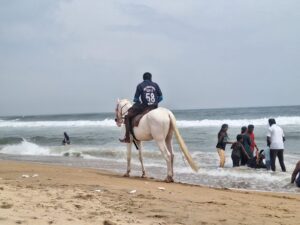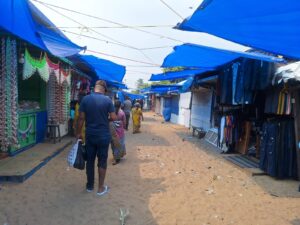Published Nov 13, 2024 | 9:00 AM ⚊ Updated Nov 13, 2024 | 10:27 AM

The vendors of Marina Beach form a unique community held together by their love for the beach. (Nitika Shivani/South First)
The elderly woman’s eyes are mischievous as she glances at the people on Marina Beach in Chennai. She holds many life secrets, like the vast expanse of rolling blue in front of her.
Chitama (name changed) is a fortune teller. She has always been one. Sitting next to a board extending an invitation to “Know Your Future” at a comfortable corner of the beach, she baits her clients, often dropping a couple of predictions, unsolicited and free of cost.
The years gone by have equipped her with the skill to read people — and their untold fears and dreams.
“I can even tell the future of this beach,” she laughed. It could be true. She has been on the beach for long. The worn tarot cards testified to the years of telling fortune, encouraging many people to keep going.
“People come to me when they’re curious or uncertain,” she continued with a know-all smile. “I help them find a little peace,” her words sounding philosophical and highlighting the role of the disappearing tribe of streetside fortune tellers.
Chitama is proud of her work. She sees herself as a part guide, part friend to beachgoers.
“For some, it’s just a bit of fun but many others come to me looking for hope. I listen to their worries, and in a way, I’m helping them bury something in the sand here,” she sounded philosophical.
Chitama is one of the many who eke out a living on the beach. Until asked for, they remain nameless, secluded but part of the sea of humanity visiting the beach. Visitors keep changing, but the sea, the beach, and the vendors remain the same.

A horse to the rescue and a ride across the shores. A fun activity for many. (Nitika Shivani/South First)
Diwakar has his ware spread out on a mat. The colourful toys attracted the attention of children, who forgot the sea and sand. Diwakar greeted them and their parents enthusiastically, hoping to sell as many toys as he could before the emptiness of night took over the beach.
“I’ve been here for over a decade. I see people come and go, but the sea and I, we remain,” he beamed while glancing at the horizon.
Diwakar dreams of providing a better life for his two children. “Every rupee I earn here is for them,” he said. The man definitely did not want his children to be a constant presence like him on the beach. He wants them to be like the visitors.
“I don’t want them to struggle like I did. I want them to go to school and learn. It’s why I am here daily, rain or shine. I make enough money to send them to a small school nearby, and that’s enough for me,” his voice softened as he talked about his children.
Not far away from Diwakar, Dharani (name changed) has set up her snack stall. She has followed her father to the beach.
Circumstances brought Dharani to the seashore. “My father owns this stall,” the twenty-something woman said. “I help him,” she added.
Dharani did not want to be a vendor on the beach. She had always wanted to be a dancer. “I always dreamt of being a dancer,” the young woman looked at the excited children on the beach.
“Ever since I was little, I would practice dance steps at home, and imagine to be performing on a stage. We don’t have enough money to make my dreams a reality,” she said even as loose strands of hair danced in the wind to the familiar crash and roll music of the sea.
She did not hide her disappointment, albeit briefly. “Whenever I come across buskers, a part of me aches over that lost chance,” she ran her hand over the dancing strands of hair. “Still, I find joy here, seeing the happiness on people’s faces when they eat something I made,” she brightened up.
While leaving her behind, the image of a little girl writing her dream on the sand kept playing in the mind. The sea repeatedly erased the words, forcing her to start afresh. As dusk fell, she left the beach, before the dream could take shape.

Food, fish, gossip, and laughter stalls to sit and eat near the foot of the beach. (Nitika Shivani/South First)
Bright, colourful balloons dancing over the crowd catch the attention from afar. Esu weaves his way through the crowd with the balloons, stopping frequently to chat with curious children. The balloons have made him an important person in the eyes of the kids.
Esu is aware of it. “These balloons are like me,” he chuckled. “They look light and fun but carry a lot of weight,” he added.
The 32-year-old man carries a lot of weight in his mind but successfully hides it with his charming smile. “I have to take care of my aging parents. “It’s not easy,” the smile did not leave his face. “Some days, I hardly make enough to buy groceries, but I can’t complain.”
Esu likes the beach. “It gives me peace. During difficult times I look at the sea, and it gives me strength. I keep coming back here because of that feeling. I can go somewhere else but this place feels like home,” he said with a sense of belonging.
For the man, the sea, soothing and caring, has become a source of confidence — the confidence that makes him smile in the face of adversity.
Neelama’s (name changed) nimble fingers kept making garlands of jasmine and marigold even as her eyes scanned the crowd for a possible familiar face.
“When I started selling flowers, the crowd here was small. I knew almost everyone. But people from even far-off places,” the woman in her late 50s could not find anyone familiar.
Neelama was young she started selling flowers on the beach. “I grew up close to the beach,” she did not hesitate to reveal her familiarity with the sun, sea, and sand.
The woman’s days are hectic. She goes to the flower market before daybreak and reaches the beach by noon. Neelama does not sell enough flowers to make a decent profit, but she has no complaints.
“These flowers add a bit of colour and fragrance to people’s lives, and it makes me happy. I may not make a lot (of money), but every time someone buys flowers for a special occasion, I feel like I am part of something meaningful,” she kept smiling.
There were days on which Neelama had gone home with money just enough for a meal. However, she has no regrets.
“I love what I do. I know the sea, and I know the beach. Even if I don’t make much, this beach, these flowers keep me going,” the sprightly woman added even as she arranged a few garlands she had just made.
“Velankini Thaiamma,” the woman replied when asked for her name. Thaiamma is her pet name.
She was slicing mangoes and watermelons, each piece uniform in size. Thaiamma has been selling cut fruit on the beach along with her husband.
“I come here every day, irrespective of the weather. The sun is fierce, the heat leaves me zapped, and sometimes the wind itself is too hot. But I keep coming here because this is our only income,” she said while serving a customer.
“We don’t make much money, but as long as I can sell enough fruit to get us a meal at the end of the day, I’m grateful,” her only wish is modest.
Kumara (name changed) is not after fame or money. A simple nod in appreciation will make his day.
The tattoo artist sat in his stall with grips, tips, tubes, and inkcaps neatly stacked. However, very few visit him for a tattoo.
“People think it’s unhygienic here because we don’t have fancy setups like the big studios,” he used first-plural pronouns. “They have glass walls, air conditioning, etc. We don’t have those luxuries but our work is done with just as much care. I do this because I love it, not for fame.”
Art is life for Kumara. He expects his stall on the beach will help him spread his art. “Some days, I earn barely enough for meals. But when someone appreciates the tattoo or stops to ask questions about it — that’s what I live for,” he softly patted the tattooing equipment like a mother putting her baby to bed.

Where various ends meet. Stalls of different kinds invite people to shop. (Nitika Shivani/South First)
Life is not soothing, smooth, or sweet like the ice creams that Thinakara Ramasamy sells. A pleasant, gentle soul, he has made the Marina his second home.
“I’m 44, and I haven’t married. It’s just me and the beach,” he smiled. “I love the simplicity here. I meet so many people and hear so many stories. Sometimes, I think I know more about people just from their expressions when they buy ice cream.”
Ramasamy’s earnings are modest, often just enough to cover his basic expenses. “I shuttle between Marina and Besant Nagar Beach, depending on the crowd. Some days are good, and some days aren’t, but I manage,” he said.
“This life may be simple but meaningful. I don’t need much, and the beach gives me peace. It feels like it’s a part of me,” the man took his pushcart along the beach.
Marie and Shallong, a couple from the Northeast arrived in Chennai five years ago. They have a small stall selling sunglasses on the beach.
“The income is unpredictable. We depend on the crowd,” Marie adjusted the sunglasses on display. “Sometimes, during the weekends or holidays, we get a good number of customers, but on regular days, it is hard to sell even a few pairs.”
Shallong chipped in. “We came here to build a life, but we didn’t expect it to be this uncertain. There are days when we make enough, and other times when we have to dip into our savings.”
Like many others, the couple, too, has fallen in love with the beach. “We’ve grown to love this place. Marina Beach has a life of its own, and while being here, we feel connected to something larger. Each person who buys a pair of sunglasses carries a piece of our story with them,” Shallong added.
The vendors of Marina Beach, from Chitama to Marie and Shallong, form a unique community held together by their love for the beach. Each person’s story is a testament to the resilience that defines them, even as they face the daily challenges of unpredictable earnings and the relentless sun.
For them, Marina Beach is not just a place to work. The beach is a way of life. It is where they laugh, share, and find solace amidst the struggle, all while offering joy and small comforts to those who visit.
Diwakar summed up the life on the beach succinctly. “We’re all part of this beach. Every one of us — even the sea — are connected.”
(Edited by Majnu Babu).

